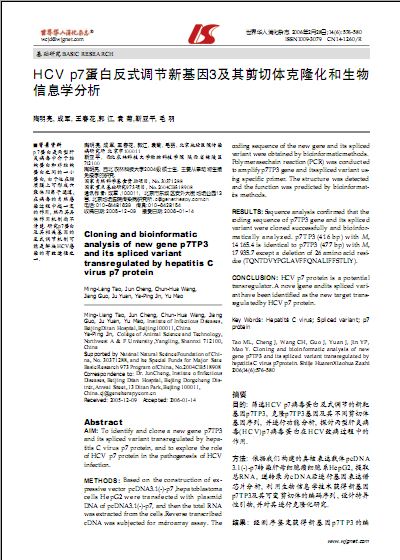HCV p7蛋白反式调节新基因3及其剪切体克隆化和生物信息学分析
http://www.100md.com
陶明亮, 成 军, 王春花, 郭 江, 袁 菊,
丙型肝炎病毒;剪切体;p7蛋白,HCVp7蛋白反式调节新基因3及其剪切体克隆化和生物信息学分析,陶明亮,成军,王春花,郭江,袁菊,毛羽,靳亚平,陶明亮,通讯作者:,Cloningandbioin
 |
| 第1页 |
参见附件(900KB,5页)。
陶明亮, 成军, 王春花, 郭江, 袁菊, 毛羽, 北京地坛医院传染病研究所 北京市 100011
靳亚平, 西北农林科技大学动物科技学院 陕西省杨陵区 712100
陶明亮, 西北农林科技大学2004级硕士生, 主要从事动物生殖免疫学的研究.
国家自然科学基金资助项目, No. 30371288
国家重点基础研究973项目, No. 2004CB518908
通讯作者: 成军, 100011, 北京市东城区安外大街地坛公园13号, 北京地坛医院传染病研究所. cj@genetherapy.com.cn
电话: 010-64481639 传真: 010-6428154
收稿日期: 2005-12-09 接受日期: 2006-01-14
Cloning and bioinformatic analysis of new gene p7TP3 and its spliced variant transregulated by hepatitis C virus p7 protein
Ming-Liang Tao, Jun Cheng, Chun-Hua Wang, Jiang Guo, Ju Yuan, Ya-Ping Jin, Yu Mao
Ming-Liang Tao, Jun Cheng, Chun-Hua Wang, Jiang Guo, Ju Yuan, Yu Mao, Institute of Infectious Diseases, Beijing Ditan Hospital, Beijing 100011, China
Ya-Ping Jin, College of Animal Science and Technology, Northwest A & F University, Yangling, Shannxi 712100, China
Supported by National Natural Science Foundation of China, No. 30371288, and the Special Funds for Major State Basic Research 973 Program of China, No. 2004CB518908
Correspondence to: Dr. Jun Cheng, Institute of Infectious Diseases, Beijing Ditan Hospital, Beijing Dongcheng District, Anwai Street, 13 Ditan Park, Beijing 100011, China. cj@genetherapy.com.cn
Received: 2005-12-09 Accepted: 2006-01-14
Abstract
AIM: To identify and clone a new gene p7TP3 and its spliced variant transregulated by hepa-titis C virus p7 protein, and to explore the role of HCV p7 protein in the pathogenesis of HCV infection.
METHODS: Based on the construction of expressive vector pcDNA3.1(-)-p7, hepatoblastoma cells HepG2 were transfected with plasmid DNA of pcDNA3.1(-)-p7, and then the total RNA was extracted from the cells. Reverse transcribed cDNA was subjected for microarray assay. The coding sequence of the new gene and its spliced variant were obtained by bioinformatic methods. Polymerase chain reaction (PCR) was conducted to amplify p7TP3 gene and its spliced variant using specific primer ......
您现在查看是摘要介绍页,详见PDF附件(900KB,5页)。